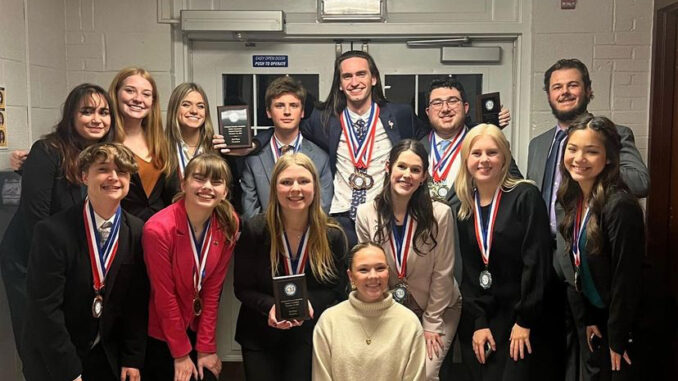
Isabella Abbott | Features Editor
On Saturday, high schoolers from around Pittsburgh followed the blue and red balloons hung up around campus all the way to Mellon to compete in a debate tournament hosted by the Duquesne Debate Society.
Members of the Duquesne Debate Society were up bright and early to prepare campus for their high school visitors. Team president Allison Rousu said the entirety of the event “ran smoothly.”
“As the team, we were there as a presence, answering questions about what it’s like to be in speech and debate at the collegiate level,” Rousu said.
“And those of us who had our clearances were able to actually sit in and judge the events.”
Rousu was able to judge one of the debates on taxes and universal basic income.
“A lot of your role as a judge is to not only decide who wins but also try to provide constructive feedback on how they can do better in the future, especially in this type of debate where they’re debating the same topic all year round,” Rousu said.
The assistant coach for the debate team, Bethany Ripley, said the college students did a fantastic job judging.
“They’re always super positive and always willing to help new students and do outreach for debate programs, so I’m very proud of them,” Ripley said.
The Public Debate Chair of the society, Nicholas Freilino, who also judged, said it was a great experience.
“I really enjoyed judging, I like to be able to see what high school debate looks like since that wasn’t something I had experience with,” Freilino said. “I think it helped open me up to different perspectives on debate and different ways of approaching it.”
In preparation for the day, members of the society helped organize trophies, blow up balloons and put balloons up throughout campus.
Some members of the Debate Society were also able to form questions for the high schooler’s discussions.
These questions were then used as part of the extemporaneous speaking portion of the debate, meaning the students did not prepare for the speech before coming to campus.
“High schoolers would get three different prompts about current events and then get 30 minutes to research them and then write a separate speech,” Rousu said.
Freilino said the students liked the questions and how they were “engaging with current events” during that specific portion.
Co-president John Chekal said the questions “were probably the most successful part of the event.”
More than 200 high schoolers participated, higher than previous years.
“From what we did last year to this year, I believe we had double the amount of high schoolers come,” Ripley said. “I think it gave a lot of students the opportunity to get a lot of insight on their debate skills and see other people from the area excelling and supporting each other in that manner.”
Rousu said the number of students present was similar to other campus events.
“We had about as many high schoolers as a lot of the admissions events will bring in for Duke Days, it was really exciting,” Rousu said. “That’s why we had the Honors College stand there as well as Duquesne admissions, to not only provide a service to the students, let them be at the tournament, but also to have an opportunity for them to see what it’s like at Duquesne.”
Although the debate society had only a couple of members after the pandemic, Chekal said they’ve grown throughout the years.
“We were a fairly small team, but over the past three years, we have grown a lot,” Chekal said. “So it’s been great to see the program grow, to see us find our footing…and I think it’s a beautiful experience to be part of.”
The team of Duquesne debaters has been able to send more students to recent tournaments, including last spring, where students went to the Pi Kappa Delta national forensic tournament in West Chester, Pennsylvania.
At this tournament, one of Duquesne’s teams made it to the semi-final round and received a third and fourth-place award in the nation.
The debate society is open to any student.
